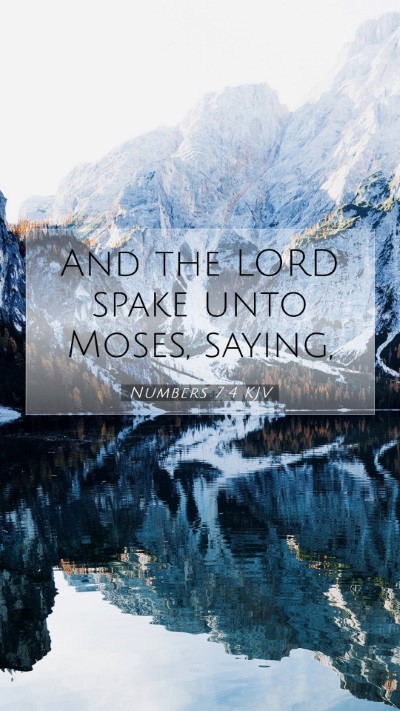Understanding Numbers 7:4
Numbers 7:4 provides a significant moment in the biblical narrative, where God instructs Moses about the offerings of the leaders of Israel. This passage is often examined for its rich theological insights and practical applications. Below, we combine the insights of public domain commentaries by Matthew Henry, Albert Barnes, and Adam Clarke to provide a comprehensive understanding of this verse.
Bible Verse Context
The verse states: "And the LORD spoke unto Moses, saying, Take one of each tribe, a leader from each tribe, to bring their offering unto the LORD." This instruction follows the organization of the Israelites around the tabernacle and signifies the importance of community and leadership in their worship.
Verse Explanation
This command from God to Moses emphasizes the collective responsibility of the leaders of Israel in presenting offerings. Commentary insights highlight the following points:
- Divine Directive: Albert Barnes points out that God directingly communicates with Moses, underscoring the authority of divine instructions in guiding communal practices.
- Representation: Adam Clarke notes that each leader representing their tribe signifies unity among the tribes of Israel, showcasing that worship is a communal activity requiring participation from all members.
- Offering Significance: Matthew Henry emphasizes that offerings were not mere rituals but a way of expressing gratitude and reverence towards God, demonstrating obedience and devotion.
- Leadership Role: The choice of leaders reflects the vital role of those in authority as spiritual examples to their respective tribes, a concept that remains relevant for modern-day church leaders.
Biblical Exegesis
This verse serves as a gateway to deeper biblical exegesis. Insights regarding the cultural and historical context of Israel during the wilderness journey reveal the importance of leadership and accountability in spiritual matters:
- Historical Context: Understanding the socio-political landscape of the Israelites aids in grasping why structured leadership and offerings were essential during this formative period.
- Symbolism in Offerings: Each offering represented more than just gifts to God; they expressed faith, commitment, and the desire for divine favor, also symbolizing God's covenantal relationship with His people.
- Connection to Later Texts: This passage foreshadows the significance of leadership and sacrifice, seen later in the teachings of Jesus, who is the ultimate leader and sacrifice for humanity.
Application of Scripture
When applying the lessons from Numbers 7:4 to daily life, individuals can reflect on the following:
- Importance of Leadership: Whether in family, work or community settings, the principles of leading by example and serving others remain crucial.
- Participation in Worship: The communal aspect of worship highlighted in this verse encourages believers to actively engage in their faith communities, showcasing their devotion through service and offerings.
- Gratitude and Offerings: Christians today can reflect on their offerings as acts of worship, not solely through material gifts but through time, service, and love in their communities.
Cross References
This verse relates to several other biblical passages that enhance its significance:
- Exodus 30:12-16: Discusses the census and offerings for atonement.
- Deuteronomy 16:16-17: Commands on appearing before the Lord with offerings three times a year.
- Hebrews 10:24-25: Encourages believers not to forsake gathering together, emphasizing communal worship.
Conclusion
In conclusion, Numbers 7:4 serves as a profound reminder of the importance of leadership, community involvement in worship, and the significance of offerings to God. By examining the verse through a lens of historical context and practical application, believers can derive wisdom and inspiration for their spiritual journeys.


